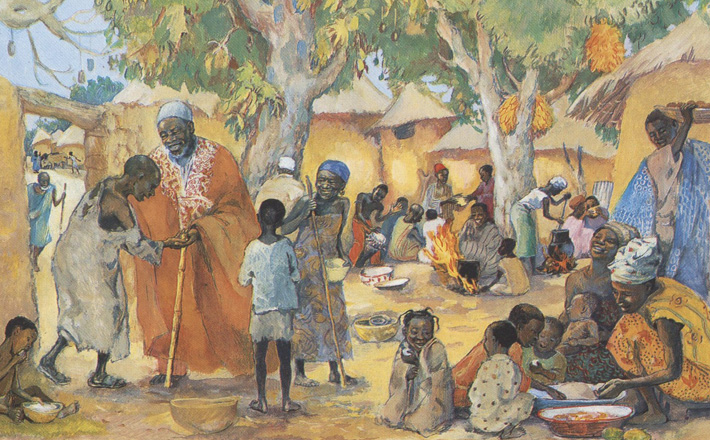Commentary on Jeremiah 2:4-13
“For my people have committed two evils: they have forsaken me, the fountain of living water, and dug out cisterns for themselves, cracked cisterns that can hold no water” (Jeremiah 2:13 NRSV).
Living water rains, runs, flows, and swirls. It washes away impurity, transports nutrients, constitutes leaf and stem, blood and bone. Where water flows, life abounds. Where water stagnates, disease takes hold. Where there is no water, life cannot even begin.
As today, so in ancient times, the climate of much of Israel was defined by a rainy season (winter) and a dry season (summer). The summer brought sunshine and beautiful blue skies. But if one did not live near a natural, perennial source of living water, such as a spring, water could be hard to come by, and was truly precious.
Israel’s Iron Age (ca. 1200-539 BCE) was a time of technological innovation. New technologies such as terracing and iron plow-points facilitated agricultural intensification and geographical expansion. Another technology whose use made it possible for Israelites to settle and thrive in highland regions that had previously been inhospitable was the cistern. In Israel’s central highlands, settlers hewed bell-shaped cisterns from bedrock in order to collect and store surplus water from the rainy winter for use during the arid summer. They dug channels to direct rainwater into the cistern; some added a filtration system to trap dirt and debris. The cistern’s bell shape, with a narrow opening and wide well, protected the water within from contamination and evaporation. In places where the bedrock was formed predominantly from chalk, the chalk formed a natural seal when wet, further minimizing water loss. Elsewhere, cisterns could be sealed with a plaster compound made from slaked lime to prevent water from seeping out into the bedrock.1
These familiar features of daily life in Iron Age Israel and Judah provide the context and vehicle for Jeremiah’s metaphor in Jeremiah 2:13. The crisp accusation and vivid imagery of this verse, accented as it is by the repeated words, “water” and “cisterns,” set it apart as the climax of this week’s Old Testament lection. In a modern context where water flows from taps and travels in plastic bottles, it may be difficult to grasp the force of the metaphor. Many of us live with water security throughout the year and give little thought to the technologies and processes that make it possible. But this very distance from “the source” makes us all the more susceptible to the charges God here levels against the house of Israel.
What is this metaphor, and this passage, about? It’s about idolatry. It’s a familiar subject, but Jeremiah uses a new metaphor to help his people see it with fresh eyes. The tricky thing about idolatry is that often, when we’re doing it, it doesn’t seem like we’re worshipping a false god. It seems like we’re worshipping a true god. Or it seems like we are pursuing good ends, ordained by our true god. It seems like we are pursuing the something necessary for our survival, and if we believe that our true god desires our survival, then surely the thing we pursue is not idolatrous. Even if it feels empty and dry. Even if it really is draining us of life and soul.
For us today, it is not incidental that Jeremiah’s metaphor invokes a pervasive technology. Jeremiah tells us that idolatry is the act of trusting in our own technologies as we move further and further from the ground of our being. Such idolatry leads us to forsake the practices of justice and the very God who sustains and nourishes us as we work to master our environments, conquer obstacles, establish security, and develop new frontiers. Too often we trade a glorious gift and calling to go after things with no substance, no meaning, and no worth.
When we exchange God for an idol, says Jeremiah, we are transformed (2:11). We become like what we pursue (2:5). If we pursue what is empty, we become empty. If we pursue vanity, we become vain. If we pursue darkness, we are assimilated into the darkness. A preacher must ask, what pursuits, what ambitions, what acquiescences lead a people away from their source? Technologies have reordered and reoriented our lives faster than we can examine and evaluate them. These cisterns can’t hold water. And it is water that we need in order to live.
The preacher has a further responsibility. As God lays out her case against her people, she repeats one charge in particular: “They did not say, ‘where is the Lord?’” (Jeremiah 2:6,8). The people did not ask, nor did their priests. But the preacher must ask this question and must ask it in front of God’s people: Where is the Lord who abhors the economy of slavery and liberates the oppressed? Where is the Lord who lights up the impenetrable darkness and leads refugees in the wilderness?
The opening words of this lection, “Hear the word of the Lord, O house of Jacob, and all the families of the house of Israel” (Jeremiah 2:4) echo the well-known phrase, “Hear, O Israel,” that begins the Shema‘ prayer in Deuteronomy 6:4. The instruction contained in this prayer emphasizes the constant mindfulness and diligence that is required to maintain one’s allegiance to the one God. Even at Sinai, God knew how easy it would be for the people to forget, to be distracted by comfort, boredom, anxiety, or ambition. As you preach this week, help your congregation look for God in the wilderness, in the wires, in the weeds. Help them to see God working to free the oppressed and answer God’s call to justice. As you preach the Gospel this week, give God’s people living water to drink, that they might live.
Notes:
1 Joseph A. Callaway, “A New Perspective on the Hill Country Settlement of Canaan in Iron Age I,” in Palestine in the Bronze and Iron Ages, ed. Jonathan N. Tubb (London: University of London Institute of Archaeology, 1985), 31-49.


August 28, 2016